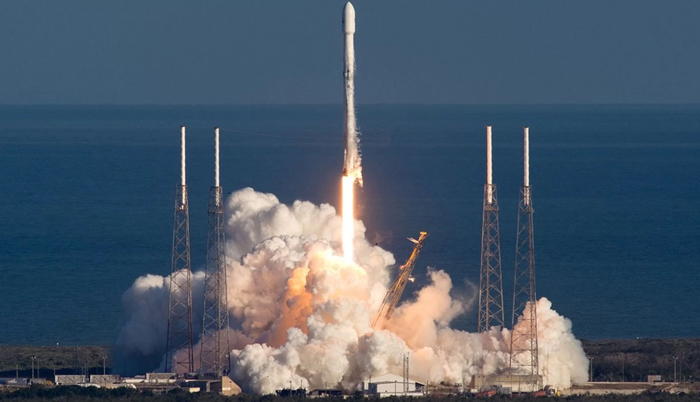![]() Home > Space & Science
Home > Space & Science
NASA Certifies SpaceX's Falcon 9 Rockets for Science Missions

The Falcon 9 launch of GovSat-1 in January. SpaceX is now certified to use that rocket for NASA science missions, starting with an astronomy satellite scheduled for launch no earlier than mid-April. Credit: SpaceX
![]() February 20th, 2018 | 10:16 AM |
February 20th, 2018 | 10:16 AM | ![]() 1314 views
1314 views
WASHINGTON
NASA has certified the current version of the SpaceX Falcon 9 to launch some categories of science missions, a milestone needed for the upcoming, but delayed, launch of an astronomy spacecraft.
NASA disclosed the certification in its full fiscal year 2019 budget proposal, released Feb. 14, in a section about NASA's Launch Services Program (LSP). "In January 2018, SpaceX successfully completed ‘Category 2’ certification of the SpaceX Falcon 9 ‘Full Thrust’ with LSP which supports the launch of the NASA Transiting Exoplanet Survey Satellite (TESS) mission in March 2018," it stated.
A passage on the following page appeared to contradict that claim, stating that certification of that version of the Falcon 9 "is nearing completion." However, agency spokesperson Cheryl Warner said Feb. 15 that LSP completed the Category 2 certification of the rocket Jan. 11.
Category 2 certification covers "medium risk" missions, and requires between one and three consecutive successful missions, depending on the vehicle’s heritage and level of NASA insight. That certification was required to clear the way for the launch of TESS.
That certification was expected, but the fact that the certification was still pending late last year was a cause of concern to some. At a Dec. 6 hearing of the House space subcommittee, Cristina Chaplain of the U.S. Government Accountability Office cautioned that one risk for the TESS mission was that SpaceX may need more time than anticipated to be certified by NASA.
Rep. Mo Brooks (R-Ala.) also raised questions about the vehicle's certification, citing a June 2015 launch failure on a space station cargo mission and September 2016 pad explosion. "Do you have any concerns that the Block 4 version of the SpaceX Falcon 9 rocket will not be certified in time for TESS to launch in March of 2018?" he asked Thomas Zurbuchen, NASA associate administrator for science and one of the witnesses at the hearing.
"At this moment in time I don't have any such concerns," Zurbuchen responded, noting that final certification was scheduled at that time for early 2018.
While the Falcon 9 is now certified to launch TESS, that launch won’t take place in March as previously planned. NASA said in a Feb. 15 release regarding the spacecraft’s arrival in Florida for launch preparations that the launch was now scheduled for no earlier than April 16. NASA had previously given a date of no earlier than March 20.
NASA Goddard Space Flight Center spokesperson Claire Saravia said Feb. 15 that the launch was postponed at the request of SpaceX, who sought "additional time for hardware readiness and to meet NASA launch service mission requirements." The spacecraft itself, she added, was in "excellent condition" at the Kennedy Space Center, where it undergo payload processing for the launch.
TESS will launch into an elliptical orbit that is in a 2:1 resonance with the moon to perform an all-sky survey to search for exoplanets around the nearest and brightest stars. That orbit is very stable and also allows for high data rates from the spacecraft.
However, it limits the days on which TESS can launch in order to phase into the proper trajectory. In an interview in January, George Ricker, principal investigator for TESS at the Massachusetts Institute of Technology, said there were about 40 days from March through June on which TESS could launch.
Besides certifying the Falcon 9, the Launch Services Program has been supporting "preliminary activities" for certifying the current version of the Orbital ATK Antares launch vehicle, according to the budget documents. The program has also started certification discussions regarding vehicles still in development, including Blue Origin's New Glenn, Orbital ATK's Next General Launch and United Launch Alliance's Vulcan.
Source:
courtesy of SPACE
by Jeff Foust
If you have any stories or news that you would like to share with the global online community, please feel free to share it with us by contacting us directly at [email protected]